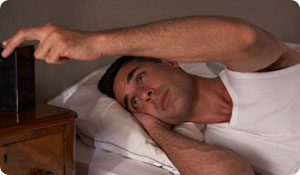
If you're caught up in a cycle of sleepless nights, there's a drug-free way to get back on track: Make love more often.
Whenever you read tips for beating insomnia, you probably see the advice to use your bed (and bedroom) only for sleeping and sex. Well, there's good reason for that: Most activities give your brain and body the wrong message about why you are in bed so that you come to view your bed not as a place to sleep, but as a place to do other things, such as read, write, or watch television. Sex is one of the few activities that will help you fall asleep right there in your bed, rather than keep you awake. In fact, sex is the only vigorous exercise recommended right before bedtime.
Like a warm bath, sex relaxes you and helps you wind down after a long day. And it's not just due to happenstance, or the fact that sex can be a good physical workout that tires you out, that sex is associated with nighttime and your bedroom, or even that good sex promotes bonding that helps you feel emotionally stable and generally less stressed; your brain chemistry also plays a key role in the transition from sex to sleep.
During sex, and especially during orgasm, your body releases specific hormones that are also feel-good substances known as endorphins. One of the key hormones released is oxytocin, which not only activates the pleasure regions of your brain but also acts like an opiate, or natural tranquilizer, to reduce stress, induce trust, relax you, and help you go to sleep.
The hormone prolactin, also released during orgasm, is associated with several body functions, including breastfeeding, erectile function, and sexual desire and satisfaction. It is released in highest concentrations during sleep and laboratory studies have shown that prolactin injected in animals promotes REM sleep.
No partner? No problem. Sex, or more specifically, orgasm, with or without a partner, produces hormones that play a role in helping you relax and fall asleep. A German study published in a 1999 issue of the professional journal Psychosomatic Medicine, found that women who masturbated to orgasm had elevated blood levels of prolactin throughout the session and for an hour afterwards. According to these researchers, similar results occur in men.
Next time you think you're too tired for sex, think again. By all accounts, sex in and of itself may not help you sleep better, but satisfying sex that results in orgasm and a shower of harmonious hormones, just might.
Sources:
Exton MS, et al; "Cardiovascular and Endocrine Alterations After Masturbation-Induced Orgasm in Women." Psychosomatic Medicine. 1999 May-Jun;61(3):290-9. Web 26 Aug 2011. http://www.ncbi.nlm.nih.gov/pubmed/10367606
Kruger, TH, et al; "Orgasm-Induced Prolactin Secretion: Feedback Control of Sexual Drive?" Neuroscience and Biobehavioral Reviews. 2002 Jan;26(1):331-44. Web 26 Aug 2011. http://www.ncbi.nlm.nih.gov/pubmed/11835982
Lancel, M., et al; "Intracerebral Oxytocin Modulates Sleep-Wake Behaviour in Male Rats." Regulatory Peptides. 2003 Jul 16;114(2-3):145-52. Web 26 Aug 2011http://www.ncbi.nlm.nih.gov/pubmed/12832103
Mahalati, K, et al; "Oxytocin Inhibits Male Sexual Behavior in Prairie Voles." Pharmacology Biochemistry & Behavior. 1991(30):19-222. Web. 26 Aug 2011http://research.yerkes.emory.edu/Young/Getz/1991%20Mahalati%20PBB.pdf
Roky, R, et al; "Prolactin and Rapid Eye Movement Sleep Regulation." Sleep. 1995 Sep;18(7):536-42. Web 26 Aug 2011http://www.ncbi.nlm.nih.gov/pubmed/8552923





